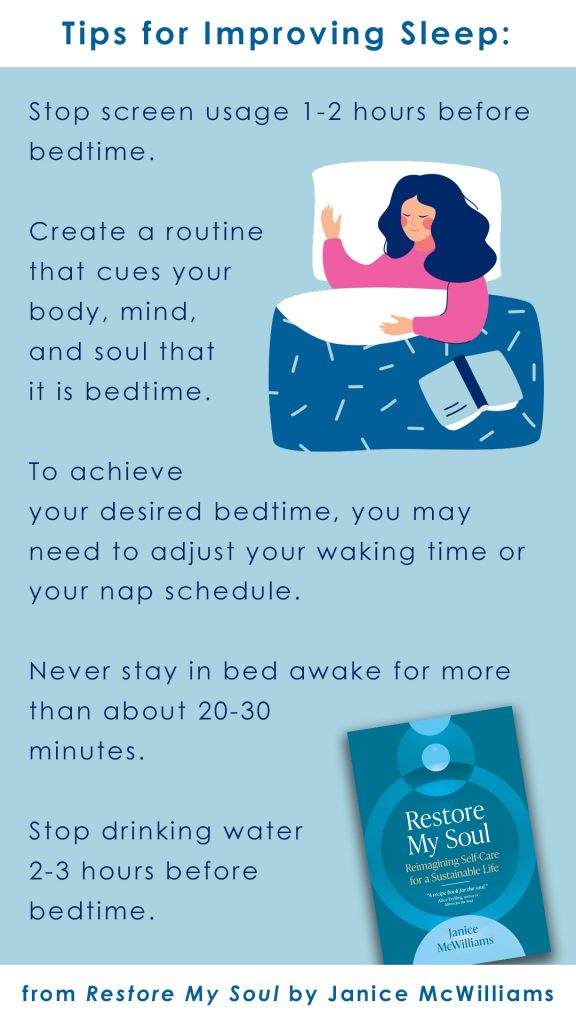“If your sleep rhythms aren’t great, I strongly encourage you to tackle this skill.”
By Janice McWilliams, adapted from the book Restore My Soul
Psalm 4:8 encourages me: “In peace I will lie down and sleep, for you alone, O Lord, will keep me safe.”
Sleep is fundamentally an act of trust, and it’s a big deal in our inner-world self-care. To get the sleep we need, we must be willing to admit that the day’s work is done. We surrender our tasks and concerns to God. Waking and sleeping are the most elemental rhythms we need to be regulated. When sleep rhythms are off balance, we become irritable and emotionally fragile, and we lose our emotional and mental resilience. I’ve made a rule for myself: If I don’t sleep well one night, I just carry on and have the best day possible. But if I don’t sleep well two or three nights, I refrain from all big-picture questions or existential musings. Without quality sleep, my perspective becomes so bleak and hopeless that entertaining such ponderings goes nowhere, fast.
The importance of sleep is a firm reality, so much so that I normally ask clients about sleep in our first session. A handful of clients have only needed two or three sessions because once the sleep issue is resolved, their other symptoms disappear. Sleep is that important. If your sleep rhythms aren’t great, I strongly encourage you to tackle this skill.
Practice the Skill of Getting Better Sleep
Following a few sleep principles can make a big difference in your well-being.
Stop screen usage one to two hours before bedtime. This practice helps your brain be less stimulated, so sleep will come more easily. If you must use a digital device just before going to bed, apply a blue-light filter.
Create a routine that cues your body, mind, and soul that it is bedtime.
You need to be awake for fourteen to sixteen hours before trying to sleep at night. So, if you sleep until 11:00 a.m. and can’t sleep the following night at 10:00 p.m., don’t diagnose yourself as a night owl too quickly. To achieve your desired bedtime, you may need to adjust your waking time.
Similarly, although naps are great and have their place, long ones can disrupt nighttime sleep. If you’re trying to regulate your sleep, consider your nap schedule.
Never stay in bed awake for more than about twenty to thirty minutes. (We quickly habituate to being in bed awake.) If you’re having trouble sleeping, try reading in a comfy chair for a while. Don’t go back to bed until you’re tired.
Follow the same pattern when you’re feeling anxious. (We can also train ourselves to worry in bed.) Get up to read, then try sleeping again once the anxiety subsides.
Stop drinking water two to three hours before bedtime. (Make sure to compensate by drinking more water earlier in the day to stay adequately hydrated.) This can help you sleep through the night without being interrupted by bathroom visits.
Experiment with other sleep-helping changes. Here are a few my clients have made: adding blackout curtains or a sound machine, changing pet sleep configuration and/or access, getting a new mattress, and trying a different bedroom temperature.
Think about which of these practices might help improve your sleep quality. Add one or two of these practices into your life for two weeks. If your sleep problem persists, don’t ignore it! Seek help. (Talk to your doctor. You may benefit from a referral to a sleep specialist.) Treatments for sleep disruption are plenteous, and restoration of this daily rhythm is perhaps the most important thing you can do to set the tone for good daily rhythms.
Download a helpful infographic summary of these sleeping tips here!

You’ve been reading from
Restore My Soul by Janice McWilliams
How is your self-care? These soul-restoring practices lead to a rich, satisfying life.
Have you tried self-care but found that you still feel overwhelmed, anxious, depressed, and are struggling emotionally? The most effective efforts aren’t desperate last-ditch attempts but practiced daily—moment by moment and hour by hour.
Janice McWilliams, a therapist and spiritual director, uses the life of Jesus as her model to help her clients achieve new levels of peace and fulfillment. In Restore My Soul, Janice shares her practical counseling insight to help you understand and practice the essential skills to manage your thoughts, live well with your emotions, and establish soul-restoring rhythms, and live a fulfilling life.
With these practices, you’ll become increasingly comfortable and confident in working through your inner experiences in real time. Instead of burning out, you can follow the lead of Jesus toward a sustainable, fulfilling life.
About the Author
Janice McWilliams (MDiv, LCPC), author of Restore My Soul: Reimagining Self-Care for a Sustainable Life, has nourished a lifelong curiosity about human nature. This has propelled her to serve in campus ministry, to speak and train groups in churches and organizations, and to work as a therapist, spiritual director, and writer. Her love of the depths and intrigue of the human experience is matched by her desire to find her place in God’s work of restoring and revitalizing souls everywhere. Find out more at janicemcwilliams.com.





